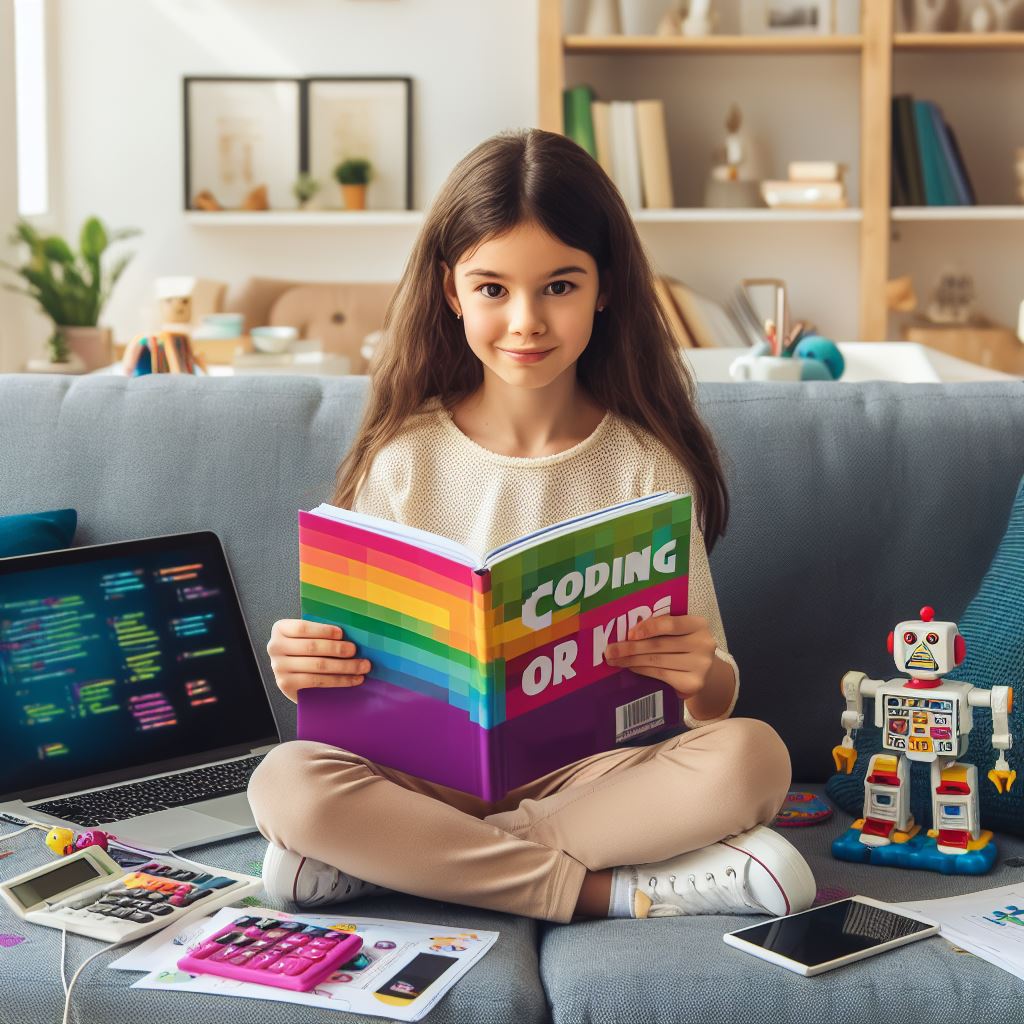Introduction
Introducing coding to kids at an early age is crucial in today’s digital world. By learning to code, children can harness their passion and creativity, paving the way for future success.
This blog section will provide a brief overview of the importance of coding for kids and how it can ignite their passion and creativity.
Coding is not just about writing lines of code; it’s about problem-solving and critical thinking skills.
Teaching kids to code from a young age helps them develop logical reasoning and analytical skills.
Moreover, introducing coding to children at an early age can ignite their passion for technology.
They can see firsthand how their ideas and creativity can come to life through coding, instilling a sense of accomplishment and motivating them to explore further.
By immersing kids in the world of coding, we can cultivate their curiosity and desire to create.
It sparks their imagination and empowers them to think outside the box, ultimately fostering a lifelong love for learning and innovation.
Throughout this blog post, we will explore the best coding books for kids, which serve as invaluable tools in igniting their passion and creativity.
These carefully selected books combine education and entertainment, making coding accessible, fun, and engaging for young minds.
Join us, parents, teachers, and mentors, in empowering kids to shape the future with their coding skills and innovation.
Read: Free Websites to Learn Full-Stack Development
Benefits of Coding Books for Kids
Coding books for kids are a great way to ignite their passion for programming from an early age.
These books offer numerous benefits that can help children develop crucial skills and abilities. Here are some of the key advantages:
Develops Problem-Solving Skills
- Kids learn how to break down complex problems into smaller, manageable parts.
- They are encouraged to find creative solutions and think critically.
- Coding books teach kids the importance of logical reasoning to solve coding challenges.
Enhances Logical Thinking Abilities
- Children are introduced to the concepts of logic and reasoning in a fun and interactive way.
- They learn to think step-by-step and follow logical processes to achieve desired outcomes.
- Coding books help kids understand cause-and-effect relationships and enhance their analytical skills.
Fosters Creativity and Innovation
- Programming allows kids to express their creativity and find unique solutions to problems.
- Coding books often involve projects that encourage kids to think outside the box.
- Children learn to experiment, iterate, and come up with innovative ideas through coding activities.
Encourages Persistence and Resilience
- Coding books teach kids that debugging and fixing errors is a normal part of the programming process.
- Children develop a growth mindset, understanding that mistakes are learning opportunities.
- They learn to persevere through challenges, improving their problem-solving abilities.
Builds Computational Thinking Skills
- Code books introduce kids to the fundamental concepts of computational thinking.
- Children develop an understanding of algorithms, patterns, and sequences.
- They learn to think logically and systematically, which can be applicable to various aspects of life.
Overall, coding books for kids offer numerous benefits beyond just teaching programming.
Tech Consulting Tailored to Your Coding Journey
Get expert guidance in coding with a personalized consultation. Receive unique, actionable insights delivered in 1-3 business days.
Get StartedThey foster important skills such as problem-solving, logical thinking, creativity, persistence, and computational thinking.
These skills are invaluable in the modern world and can prepare children for future success in a wide range of fields.
As parents and educators, introducing coding books to our children can have a significant impact on their development.
Engaging kids in coding early nurtures curiosity, encourages creativity, and prepares them for the digital age’s challenges.
Read: Best Free Resources for Learning Ruby on Rails
See Related Content: 3 Red Flags to Avoid When Applying for Coding Jobs
Criteria for Selecting the Best Coding Books for Kids
When it comes to selecting coding books for kids, there are several important criteria to consider.
These criteria ensure that the books are not only age-appropriate but also engaging and effective in igniting the passion for coding in young minds.
Let’s explore these criteria in detail:
Age Appropriateness
- The first and foremost criterion for selecting coding books for kids is age appropriateness.
- Different books cater to different age groups, ranging from preschoolers to teenagers.
- It is important to choose a book that matches the child’s age and cognitive abilities.
Clear and Concise Explanations
- Another crucial criterion is the clarity and conciseness of explanations in the coding books.
- Since these books are meant for kids, it is essential that the concepts are presented in a simple and understandable manner.
- Books with jargon-free explanations are highly recommended.
Engaging and Interactive Exercises
- The inclusion of engaging and interactive exercises is a key criterion for selecting coding books.
- These exercises provide hands-on practice and help kids apply the concepts they learn.
- Interactive activities and puzzles make the learning process enjoyable and effective.
Fun and Visually Appealing Illustrations
- A visually appealing book with fun illustrations can greatly enhance a child’s interest in coding.
- Books with colorful and engaging visuals attract kids’ attention and make the learning experience more enjoyable.
- Visual representations of coding concepts simplify complex ideas.
Availability of Guided Projects and Challenges
- To foster creativity and problem-solving skills, coding books should offer guided projects and challenges.
- These activities encourage kids to apply their coding knowledge in real-life scenarios and foster a sense of achievement.
- Guided projects provide step-by-step instructions, making it easier for kids to progress.
Reviews and Recommendations from Parents and Educators
One of the best ways to ensure the quality of a coding book is through reviews and recommendations from parents and educators.
Reading reviews and seeking recommendations can provide valuable insights into the effectiveness and appeal of a particular book.
Remember to consider the age and interests of the child when selecting a coding book.
There are numerous other excellent coding books available, and exploring different options can help find the perfect match for your child’s learning journey.
To pick the best kids’ coding books, consider age suitability, clear explanations, engaging exercises, visuals, guided projects, and positive reviews.
Build Your Vision, Perfectly Tailored
Get a custom-built website or application that matches your vision and needs. Stand out from the crowd with a solution designed just for you—professional, scalable, and seamless.
Get StartedBy choosing the right coding books, we can ignite the passion for coding in kids at an early age.
Read: Comparing Scripting Languages: Python vs Ruby

See Related Content: Coding Memes That Make Even Non-Coders Laugh
Top Coding Books for Kids
1. “Coding for Beginners Using Scratch” by Jonathan Melmoth
“Coding for Beginners Using Scratch” is an excellent introduction to coding for kids.
It teaches the fundamentals of programming using Scratch, a visual coding language.
Key Features and Highlights
- Step-by-step instructions for creating interactive projects using Scratch.
- Engaging and colorful illustrations.
- Includes fun coding challenges and puzzles.
- Encourages problem-solving and creativity.
Target Age Group
This book is suitable for children aged 8 and above who are new to coding and want to learn Scratch.
2. “Hello Ruby: Adventures in Coding” by Linda Liukas
“Hello Ruby: Adventures in Coding” takes kids on an adventure with Ruby, a young girl who loves to solve problems using coding.
Key Features and Highlights
- Introduces basic coding concepts through storytelling.
- Includes interactive activities and exercises.
- Promotes logical thinking and computational skills.
- Encourages creativity and imagination.
Target Age Group
This book targets children aged 4 to 8 and provides a gentle introduction to the world of coding.
3. “Python for Kids: A Playful Introduction to Programming” by Jason R. Briggs
“Python for Kids” is a playful introduction to programming using the Python programming language.
It teaches coding concepts by building games and interactive projects.
Key Features and Highlights
- Clear explanations of Python syntax and concepts.
- Engaging examples and projects.
- Shows how to create simple games using Python.
- Encourages problem-solving and critical thinking.
Target Age Group
This book is suitable for children aged 10 and above who want to learn programming with Python.
4. “Coding Projects in Python” by DK
“Coding Projects in Python” provides step-by-step instructions for building various projects using the Python programming language.
Key Features and Highlights
- Guides kids through creating games, animations, and quizzes.
- Includes easy-to-follow coding examples.
- Offers challenges to enhance coding skills.
- Visual explanations and illustrations.
Target Age Group
This book is suitable for children aged 12 and above who have some basic coding knowledge and want to take their skills further with Python.
5. “Coding Games in Scratch” by Jon Woodcock
“Coding Games in Scratch” teaches kids how to build their own games using Scratch, a visual coding language.
Optimize Your Profile, Get Noticed
Make your resume and LinkedIn stand out to employers with a profile that highlights your technical skills and project experience. Elevate your career with a polished and professional presence.
Get NoticedKey Features and Highlights
- Provides step-by-step instructions for creating different game projects.
- Includes game design tips and tricks.
- Encourages experimentation and customization.
- Teaches coding concepts in a fun and interactive way.
Target Age Group
This book is suitable for children aged 8 and above who have some familiarity with Scratch and want to create their own games.
In fact, these coding books for kids are excellent resources for igniting their passion for coding at an early age.
Each book offers unique features and highlights that make learning programming enjoyable and engaging.
Whether kids are interested in Scratch or Python, these books cater to different age groups and provide a great foundation for young aspiring programmers.
Read: Mobile App Development: Free Coding Websites to Use
Discover More: Swift Coding Tips: Examples for iOS Development
Uncover the Details: 5 Key Differences: Coding Skills vs. Programming Expertise
Conclusion
Introducing coding books to kids is crucial in igniting their passion for coding early on.
It reinforces the importance of technology and prepares them for the future job market.
Encouraging children to explore coding resources, such as books, online courses, and coding clubs, can further enhance their skills and knowledge in this field.
By exposing kids to coding at an early age, they develop problem-solving skills, logical thinking, and creativity.
These lifelong skills will benefit them in any career path they choose, as coding is becoming increasingly prevalent in various industries.
Moreover, early exposure to coding also increases the likelihood of children pursuing and excelling in STEM-related fields.
It breaks gender stereotypes and promotes diversity in the tech world. By fostering a love for coding in kids, we empower them to become future innovators and leaders in the digital age.
In today’s technology-driven world, coding literacy is an essential skill. Introducing coding books to kids is a valuable investment in their future success.
By starting early, we can nurture their passion for coding, equip them with the necessary skills, and open doors to limitless opportunities.
So let’s inspire our kids to explore the fascinating world of coding and shape a brighter future for them.




